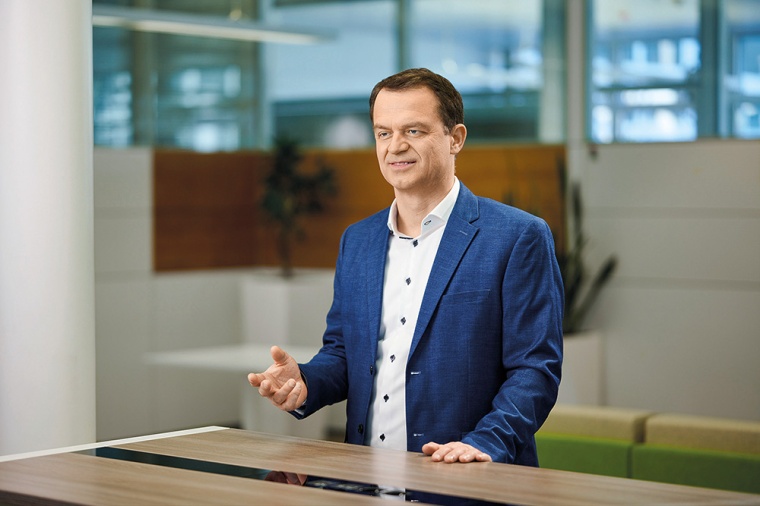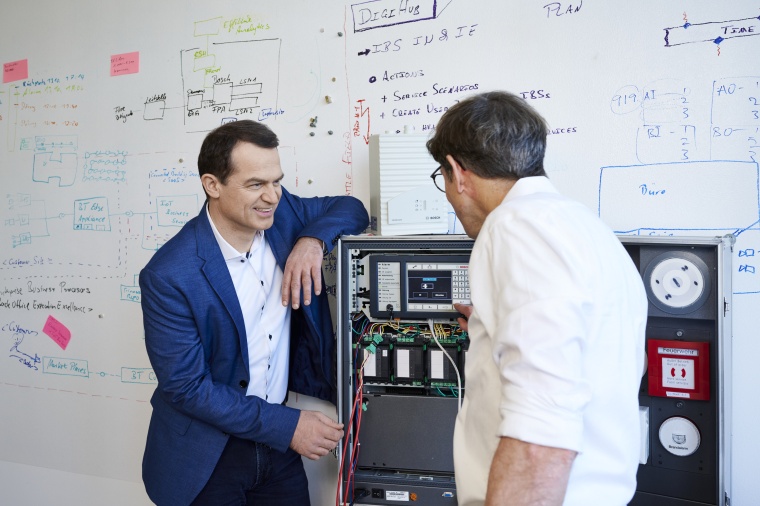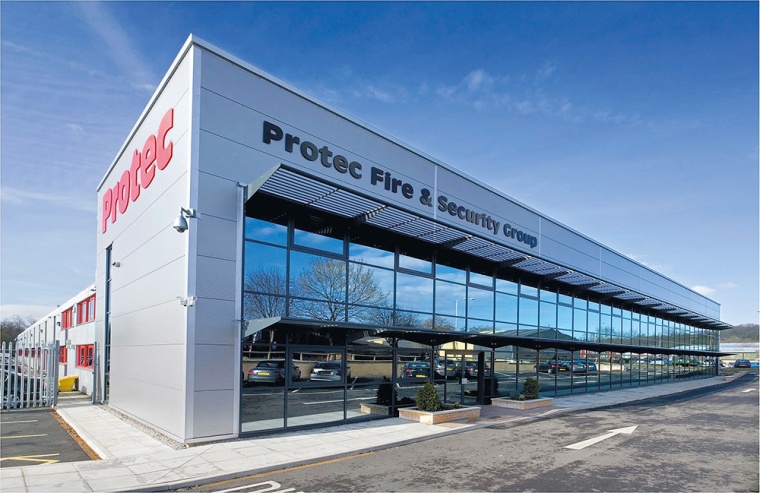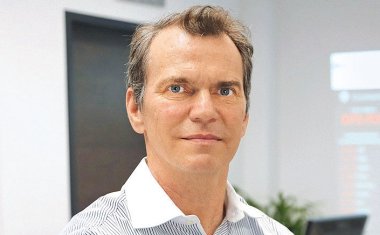Designing the Buildings of the Future
GIT SECURITY talks to Dr. Marcus Nadenau, Head of Bosch Energy and Building Solutions Europe, about megatrends in building technology, the transformation from system integrator to digital service provider, and how security, safety, comfort, sustainability and profitability can be united.

Dr. Nadenau, you are a highly qualified electrical engineer, and you have been in charge of the European system integrator business Bosch Energy and Building Solutions and its 5,000 associates since 2019. You had already held several management positions at Bosch since 2005. Before that, you worked in the United States and Switzerland for the Boston Consulting Group and Hewlett-Packard. How have these experiences shaped you?
Dr. Marcus Nadenau: Due to the experiences from many different sectors and the positions I have held abroad, I bring to the table a great interest in new technologies, an entrepreneurial mindset, and a passion for creating an open culture both within the company itself and in interactions with our customers and partners. In my current job, my focus is on growth and innovation to the benefit of our customers, partners, and our company.
Can you give us a little insight into the European system integrator business?
Dr. Marcus Nadenau: We see ourselves as the ideal partner for boosting security, safety, comfort, and efficiency in commercial buildings. We are a full-service provider throughout Europe, with a focus on Germany and the Netherlands. Our associates are highly committed to providing and implementing tailor-made, industry-specific solutions for our customers.
Which solutions and services do you offer your customers?
Dr. Marcus Nadenau: One of our key areas is security and safety of buildings. Fire protection, public address and voice alarm systems, intrusion protection, video surveillance, time recording, and access control – we offer practically the entire range of security and safety applications. In addition to our technical expertise in consulting, planning, and installation, our nationwide service team ensures smooth operations by taking care of maintenance and repairs. We have 50 locations in Germany alone, plus many, many people in the field for our customers every day – even during the pandemic, when it has not always been easy.
How is your business doing?
Dr. Marcus Nadenau: We are growing strongly, with more and more solutions in the field of building automation and energy efficiency, plus some strategic acquisitions. In 2019, we acquired the GFR – Gesellschaft für Regelungstechnik und Energieeinsparung, along with its workforce of approximately 300 employees. The company has over 40 years of experience in setting up complex automation solutions and is the perfect addition to our portfolio. From April 1, 2022, the company is operating fully integrated into our company under the name Bosch Building Automation GmbH. At the end of 2021, we completed the acquisition of the British Protec Fire and Security Group, with another 1,100 employees. Just recently we also acquired the Hörburger AG, a proven building automation specialist with around 200 employees.
What is the strategic significance of these acquisitions?
Dr. Marcus Nadenau: I am delighted that the Bosch family is getting even bigger. Protec and Hörburger fit brilliantly into our growth strategy. We have built up a very successful business in Germany and the Netherlands – and now we can really enter the UK market, which has huge potential in our view. Hörburger AG offers a comprehensive product and solutions portfolio focusing on building automation and energy management. By acquiring companies with highly qualified staff, we are strengthening our current portfolio in the areas of building security and safety, energy services, and building automation.

And how do you want to develop Bosch Energy and Building Solutions in the long term?
Dr. Marcus Nadenau: We want to be first choice for our customers in the future, too, when it comes to using technologies and services to make buildings more secure, safer, more comfortable, and more efficient. This is why we are constantly working to keep abreast of the megatrends that bring changes with them – climate change, increasing urbanization and the digital transformation, for example.
What does that mean for your sector?
Dr. Marcus Nadenau: These megatrends have a big influence on the needs of our customer groups. Climate change and energy efficiency have distinct implications for the real estate business other than for industrial companies, for example. A lot is changing on the technological front, too. We were quick to recognize that our sector was changing from one that was previously heavily based on hardware to a connected, sensor-based world. We also saw that intelligently accessing data would open up diverse new opportunities for operating buildings and infrastructures in ways that are even safer, more secure, more cost-effective, and also better for the environment. We are aligning our operations accordingly, placing a strong focus on a range of intelligent building solutions and offering increasingly more new business models in the future, including digital services that use sensor data in sophisticated ways.
How exactly should we imagine these services, and which ones will you offer?
Dr. Marcus Nadenau: I like to compare them to the digital services offered by streaming providers. It used to be that we had to buy or rent “hardware” such as a DVD if we wanted to have a movie night with the family. These days, that seems so old-fashioned. Instead, we now search for something suitable on a digital platform and watch the movie there. We enjoy the event itself, with hardly any effort involved. This principle is easily transferred. Our range of digital services is strongly focused on optimizing operations. Even when it comes to managing and securing a building, the effort involved should be kept to a minimum. A security officer who is working for our customers and is responsible for fire protection can easily access those systems and see digitally how they are running and whether everything is okay in the building. Evaluations then provide recommendations on which systems need some investment, where fire detectors need to be replaced after their expiration, for example. All this is a digital service that also highlights the budget that should be set aside for it in the coming year.
Are there any other examples of this kind of digital services?
Dr. Marcus Nadenau: Another service we are going to offer relates to monitoring and boosting the efficiency of heating, ventilation, and air conditioning systems, in short HVAC. These are subject to very complex dependencies and keeping on top of these to ensure they always operate to their best is often not easy, even for highly qualified specialist staff. Recording and linking various bits of data helps with this, and combined with AI algorithms, it is possible to optimize the operation of these systems.
Finally, it is also about diversifying digital services. I would again like to draw a comparison with the private sector, where it is possible to interact freely and easily with the established digital voice-activated assistants by simply saying something like: “XY, turn on the lights.” These habits are also driving applications in commercial buildings. For example, when I drive onto a company’s premises, I would like to know more or less immediately where I will find a free parking spot, or how I can get to the conference room where my meeting is being held with as little stress as possible once I enter the building.
Does that mean you have already had customer inquiries about these kinds of services?
Dr. Marcus Nadenau: We are receiving inquiries about those kinds of solutions more and more frequently. The demand is there. We are currently in the middle of implementing a major project with a Dutch customer, where precisely these kinds of services will be implemented as part of the digitalization of an existing campus – and we are the partner for this digital transformation.
So you think customers or operators want the solutions they have got used to having at home to be available in their workplace, too?
Dr. Marcus Nadenau: That’s right – and that will trigger more demand. Customers are becoming increasingly familiar with such features and the resulting convenience from private applications, and they are asking themselves why things should not be just as convenient in the commercial context.
What role do customers and their needs play in this precisely?
Dr. Marcus Nadenau: It goes without saying that their role is a pivotal one, and this is also something that is very important to me. Let me explain that by relating it to another experience we are all familiar with. Whenever someone unpacks a new piece of technical equipment, they do not sit down and read a long set of instructions before switching it on. It is the same thing when you open the media library on your streaming service – you want it to be easy for you to find the movie you are looking for. Digital services have to be just as simple and intuitive for our customers. Of course, there can be a very big difference between a service in an industrial context and the needs of an airport or a retail company. That is why we organize user experience workshops with our customers, run lots of interviews, conduct tests and gather feedback. We also have to understand the needs of the various parties involved and provide the best service for all of them. The operator could be a facility manager or the security officer who wants to keep the installations in the building optimized. Or in an office, it could be staff members like you and me. It could also be an employee in a hospital. Again, we have to get to grips with the context in which systems are to be used. In an office building, I am looking for the conference room, whereas in a hospital, I might need to find the nearest mobile ultrasound device in a hurry. Or I could be a real estate manager who needs a service that will boost the energy efficiency of my portfolio. Even these few examples make it clear that not all customers are the same: We specifically address the individual requirements.

Smoke alarms, heating, ventilation, air conditioning, blinds – how do you think the systems in a building will interact with each other in the future – and what timescale are we talking?
Dr. Marcus Nadenau: We are increasingly seeing systems being combined with each other already. The installed security and safety technologies and systems, building automation, and energy supplies already provide vital data on a daily basis. You just have to use this data intelligently. It is this potential we aim to maximize for our customers. Take for example the parameters and data from an existing access control system and add sensor technology that can determine when which room in the building is needed and what temperature it should be at. We then generate valuable insights for owners and operators about the utilization rate of various areas or rooms, enabling us to answer questions such as: Do I have too little space? Do I have enough? Do I need to rent more space? Are rooms being permanently heated or cooled, even though they are only occupied for short periods? This all comes under what you might call “modern management”. That was not previously the case. Instead, one focused on a solution in the individual systems. The data that was gathered was not linked, and there was certainly no overarching evaluation. – Not very efficient and not saving valuable resources – it is possible to do much better.
Are you thinking of having sensors installed in quite different systems in a building?
Dr. Marcus Nadenau: Oh, definitely! For example, it is quite possible that more sensors will be integrated into the existing, required fire alarm infrastructure. These can then be used to take measurements for assessing the air quality, for instance. In the future, building technology, installations, software, and sensors will share data from the whole building with each other in real time. This collected data can then be used to derive scenarios and forecasts that make it easier to operate the building efficiently.
How is it possible to balance technological progress and ecology, especially against the background that more comfort and convenience potentially change the ecological footprint?
Dr. Marcus Nadenau: Especially when it comes to the megatrend of climate protection, these kinds of versatile sensor environments can be used to make things more efficient and cost-effective without having to give up any comfort and convenience. It is still relatively easy to achieve sustainability effects in new buildings. Existing buildings are a much bigger task. Particularly when upgrades are being made, this offers an opportunity to install cutting-edge technologies in order to boost the efficiency of systems through intelligent controls, and thus improve the ecological footprint.
According to your analysis, how is the overall market for building technology, security and safety developing, and what role is Bosch playing in that – and what is your own personal outlook for the future?
Dr. Marcus Nadenau: The environment in which we operate is exciting and dynamic. As a result, our – my – work is really enjoyable. Bosch has an outstanding and very broad technological basis, which means we are perfectly placed to meet the challenges I already mentioned and support and equip our customers and projects brilliantly. Fundamentally, the importance of AI and connectivity is growing, as are partnerships with creative tech companies – be they major players like Microsoft or smaller startups. New services such as the ones we offer will not necessarily follow conventional business models. Our goal is to optimize building management. Digital twins and AI help put the data that has been collected into the correct context. Here is a simple example: It is only possible to assess whether 24 degrees Celsius is right for a room when you know whether it is a refrigerated room or an office workplace. Therefore, it is essential to model semantic correlations. That is precisely what we have been working on with our partners over the last few years. We feed our findings back to the community as open source, meaning they are available to all market players. Overall, I think this market will become more open. There will be less dependence on proprietary systems to meet the challenges of the future. Bosch is in a good position. We are an open company – at systems level, to new technologies, with our customers and in partnerships with interesting market players from the fields of technical facility management and real estate, for example. I am really looking forward to helping shape this future with my team.
Growth needs qualified new staff coming through. What benefits do you offer skilled associates?
Dr. Marcus Nadenau: One key point is purpose. Building solutions for a better life – that is what we stand for. Plenty of people want to be part of that and put everything into meeting some of the major challenges of the present and the future using cutting-edge technologies, solutions, and services. Specialists with this mindset are in exactly the right place here at Bosch. Anyone who joins us will find a highly motivated workforce. We live a culture of open dialog with a keen focus on end customers. What is more, our portfolio is very diverse. Whether in the office, in development or in service, as an electrician, installer or software architect, everyone has the opportunity with us to use state-of-the-art technologies and realize their full potential.










